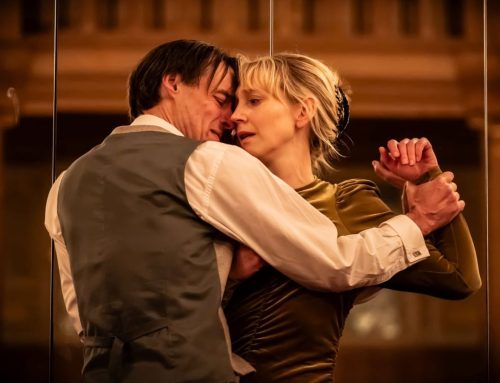Four women are locked in a palace dungeon. The stone floor is strewn with pots and pans and there are only chests and broken boxes to sit on. Candles, set in roughhewn alcoves and held in the women’s hands, light the scene. A heavy door swings open and a teenage girl, Fatah The Young (a mesmerising Alaa Habib) is bundled roughly into the cell. The door slams shut. “Look at her,” says one of the women, gesturing in the terrified girl’s direction. “Plucked and waxed and creamed and painted. Ready for battle. For the inevitable.” As a device for posing a question as to where a play is headed, opening scenes do not get much better or more atmospheric than this.
Along with the unseen Scheherazade these are the last five females of child-bearing age left alive. The fat tyrant king ensconced in the chambers above weds, beds, and beheads a new wife every day. It is only his current spouse’s ability to divert him with stories that can save these five from gruesome, bloody deaths. The problem is, though she is “a warrior, strong, with golden hair like the sun,” as an originator of engaging tales Scheherazade frankly sucks. These five women need to smuggle out fresh stories every night in order to keep the whole show on the road. But, as Akila The Writer (Nadi Kemp-Sayfi) reminds us, an “old white man” once said that there are only seven basic plots in fiction. Writing new tales, or plays for that matter, is a task that is harder than it sounds. It is one that will stretch these women’s abilities to the limit. Are they up to it? If not, Zuya The Warrior (a fantastic performance from a gold-armoured Laura Hanna) plans to have a go at the monster King with her fists. No-one seems to have much confidence in that solution.
Hannah Khalil’s wonderfully funny and impeccably executed Hakawatis: Women of the Arabian Nights is an ode to the power and potential of storytelling. It is about the ability of yarns to enthral, touch, educate and amuse, but also to subvert the powerful and to deny agency to monsters. It also has something to say about women’s relationships with each other and with the men who seek to control them. There is an irony not lost on this group: that in order to smuggle their texts to Scheherazade they must rely on the dubious favours of a male prison guard. They need men to protect them from other men, and the quid pro quo is often in the form of sexual services. Many of the narratives the women smuggle upstairs feature dumb farmers, husbands or djinns demanding a blow job from world-weary women. The story of the butcher’s wife and the puppy, one the funniest, offers Naha The Wise (Roann Hassani McCloskey) and Wadiha The Dancer (Houda Echouafni) the chance to map out some juicy retributive justice.
The women are on a journey here which is to save their lives, find strength in each other, and work out what it means to create good fiction. There is a sense that Khalil the writer is using her characters as a kind of test bed for her own reflections on what fiction requires. What kind of moral message does a story need? How do you create a hook to keep an audience engaged and a King from getting his knife out? How to you reconcile the moral responsibility of a storyteller not to damage others with the insidious creep of self-censorship? Who decides how stories end?
Khalil looks for answers to these questions in her own heritage, specifically in One Thousand and One Nights, the Arabic collection of popular tales that covers many centuries and literary traditions. Working with collaborators Hanan Al-Shaykh and Suhayla El-Bushra she has devised new tales that draw on old ideas to reflect modern concerns. In the main it works brilliantly, but there is a comic recognition here too that fiction does not always turn out as planned. Scheherazade sends word back to the appalled and insulted group, “your stories are coarse and mundane” and simply not up to scratch. Khalil is taking a pop at critics of theatre and fiction and why not.
Pooja Ghai directs briskly giving the storytelling pacing and momentum. Superb music from Kareem Samara uses traditional Arabic and Western acoustic instruments and percussion to drive the beat of the women’s stories. This whole show is an unqualified treat.
Writer: Hannah Khalil
Director: Pooja Ghai
More Recent Reviews
Playfight. Soho Theatre.
Writer Julia Grogan’s breathtakingly assured debut play arrives at Soho Theatre following stellar reviews at the Edinburgh Fringe and [...]
All The Happy Things. Soho Theatre.
Naomi Denny’s three-hander comedy-drama All The Happy Things covers familiar themes within a recognisable premise. A grieving protagonist comes [...]
Telly. Bread and Roses Theatre.
The challenge with absurdist comedy is that many people do not find it funny. Laughing at the sheer weirdness [...]



